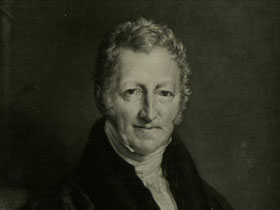The theories of the British statistician Thomas Robert Malthus were influential in shaping Darwin's ideas that in nature, there is a deadly struggle for survival and that every living thing strives only for itself. Malthus suggested that food resources increased arithmetically and the human population geometrically-for which reason, he maintained, human beings were necessarily in a fight for survival. Darwin adapted this concept of the struggle for survival to nature as a whole.
In the 19th century, Malthus' ideas were adopted by a fairly wide audience. Upper-class European intellectuals in particular supported his ideas. An article titled "The Scientific Background to the Nazi Racial Improvement Program" describes the importance that 19th-century Europe attached to Malthus' theories:
In the opening half of the nineteenth century, throughout Europe, members of the ruling classes gathered to discuss the newly discovered "Population problem" and to devise ways of implementing the Malthusian mandate, to increase the mortality rate of the poor: "Instead of recommending cleanliness to the poor, we should encourage contrary habits. In our towns we should make the streets narrower, crowd more people into the houses, and court the return of the plague. In the country we should build our villages near stagnant pools, and particularly encourage settlements in all marshy and unwholesome situations," and so forth and so on.28
Under the "oppression of the poor" program implemented in Britain in the 19th century, the strong crushed the weak in the struggle for survival, and the rapidly rising population would thus be kept in balance. The struggle for survival that Malthus regarded as theoretically necessary led to millions of poor people in Britain living wretched lives.
28. http://www.trufax.org/avoid/nazi.html.

